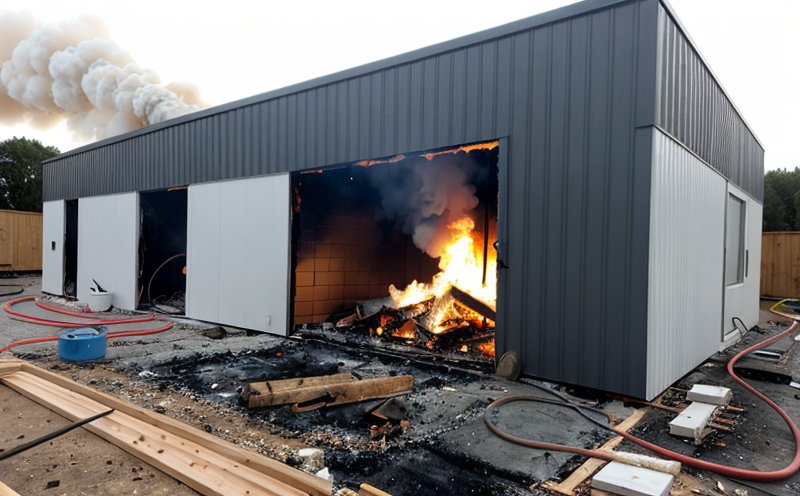Fire Resistance Testing of Composite Insulation Panels
The fire resistance testing of composite insulation panels is a crucial step in ensuring the safety and integrity of buildings, especially those with cladding systems. This test evaluates how well these panels can resist ignition, flames, heat, smoke, or other combustion products for a specified period under controlled conditions.
Composite insulation panels are widely used in various sectors such as construction, industrial facilities, and transportation due to their excellent thermal and acoustic properties. However, the fire safety performance of these materials is paramount, particularly when exposed to high-heat environments or potential ignition sources within buildings.
The testing procedure typically involves placing a composite insulation panel between two metal plates inside a furnace. The sample is subjected to controlled conditions that simulate real-world scenarios such as exposure to direct flames and radiant heat. During the test, various parameters are monitored including temperature rise, smoke generation, flame spread rate, and structural integrity.
Accurate testing is essential for ensuring compliance with international standards like ISO 1716:2004 and ASTM E84-21a. These standards provide clear guidelines on the methods to be used in conducting fire resistance tests and interpreting results. By adhering strictly to these protocols, laboratories can ensure that their test results are reliable and comparable across different jurisdictions.
The importance of this testing cannot be overstated, especially considering recent high-profile incidents involving building fires. Ensuring that composite insulation panels meet the required standards not only protects occupants but also helps prevent catastrophic failures that could lead to property damage or loss of life.
Eurolab Advantages
- Comprehensive expertise in fire safety testing across multiple sectors
- State-of-the-art facilities equipped with cutting-edge instrumentation
- Accreditation to international standards and certifications
- Dedicated team of experienced professionals specializing in composite materials
At Eurolab, our commitment to excellence is reflected in every aspect of our fire resistance testing services. Our comprehensive expertise allows us to provide tailored solutions that meet the unique needs of each client. With state-of-the-art facilities and advanced instrumentation, we ensure precise and accurate test results. Our accreditation to international standards ensures reliability and consistency in all our tests.
Our team of dedicated professionals brings extensive experience in working with composite materials, allowing us to offer insightful guidance throughout the testing process. Whether you're a quality manager looking for compliance assurance or an R&D engineer seeking innovative solutions, Eurolab is here to support your needs.
Why Choose This Test
- Ensures compliance with international standards and regulations
- Provides critical data for design and development of safer materials
- Demonstrates the fire performance capabilities under controlled conditions
- Aids in identifying potential weaknesses or improvements needed
- Supports continuous quality improvement processes
Choosing this test is vital for several reasons. It ensures that your composite insulation panels meet stringent international standards and regulations, thereby providing a benchmark of safety and reliability. This testing process also offers valuable insights during the design and development phases, helping to create safer materials.
In addition, fire resistance tests demonstrate how well these panels perform under controlled conditions, offering critical data that can be used in various applications. By identifying any potential weaknesses or areas for improvement early on, you can make informed decisions about product modifications. Regular testing supports ongoing quality control and continuous improvement efforts, ensuring that your products remain at the forefront of safety standards.
The results from these tests are not only useful internally but also provide third-party validation which is increasingly important in today’s competitive market. Potential clients or regulatory bodies will have confidence knowing they are dealing with a company that adheres to high-quality testing practices, ultimately enhancing your reputation and credibility.
Use Cases and Application Examples
The fire resistance testing of composite insulation panels is particularly important in several key areas:
- New Construction Projects: Ensuring that new buildings are designed with fire safety in mind.
- Retrofitting Existing Buildings: Assessing the current state of existing structures and identifying necessary upgrades.
- Manufacturing Facilities: Evaluating materials used in industrial settings where heat management is critical.
- Cargo Containers & Trailers: Verifying fire resistance properties for transport vehicles to comply with safety requirements.
In new construction projects, fire resistance testing helps architects and engineers design buildings that meet local codes and standards. It ensures that all components contribute effectively towards reducing the risk of fires spreading rapidly through the structure. Similarly, during retrofitting efforts, this test plays a vital role in assessing whether existing materials need replacement or enhancement to improve overall safety.
For manufacturing facilities, especially those dealing with flammable products, fire resistance testing ensures that insulation systems are robust enough to withstand accidental fires without compromising on performance. Cargo containers and trailers also benefit significantly from this type of testing as they must adhere to strict international regulations concerning fire safety to protect cargo integrity during transit.
By incorporating these tests into your procurement processes or R&D projects, you can ensure that the composite insulation panels used in any application are safe and effective. This proactive approach not only protects people but also helps maintain operational efficiency by minimizing disruptions caused by unexpected failures due to fire hazards.





